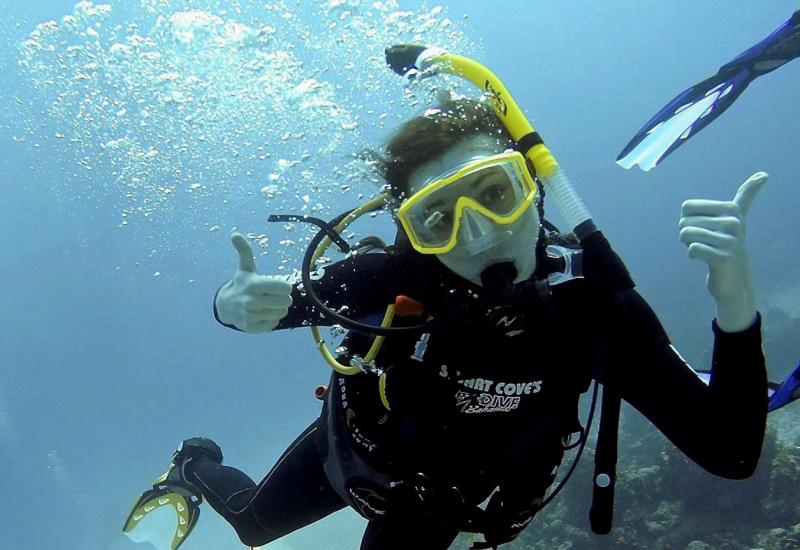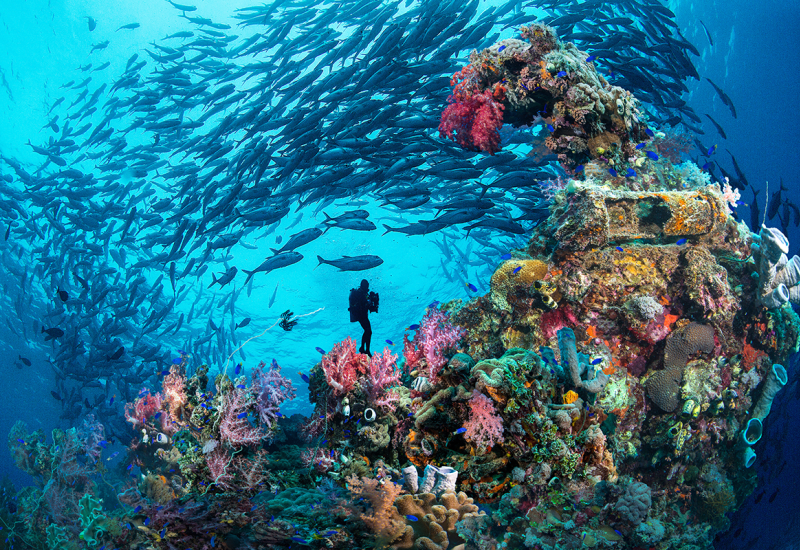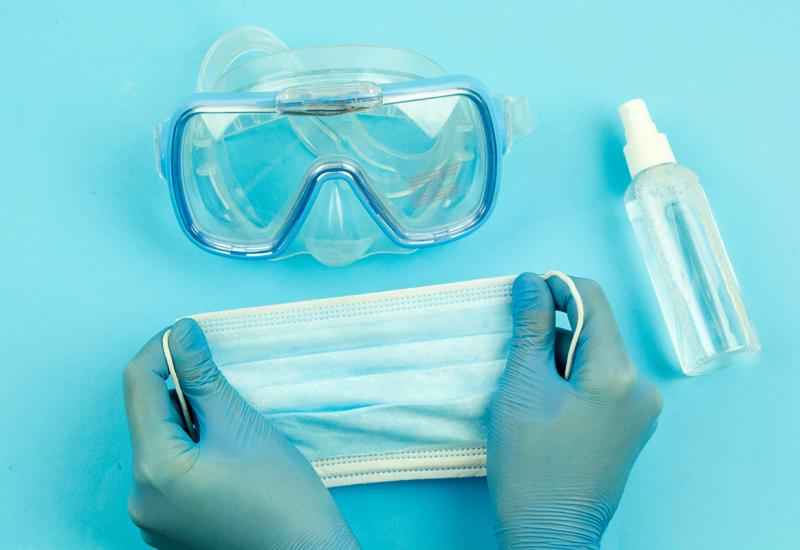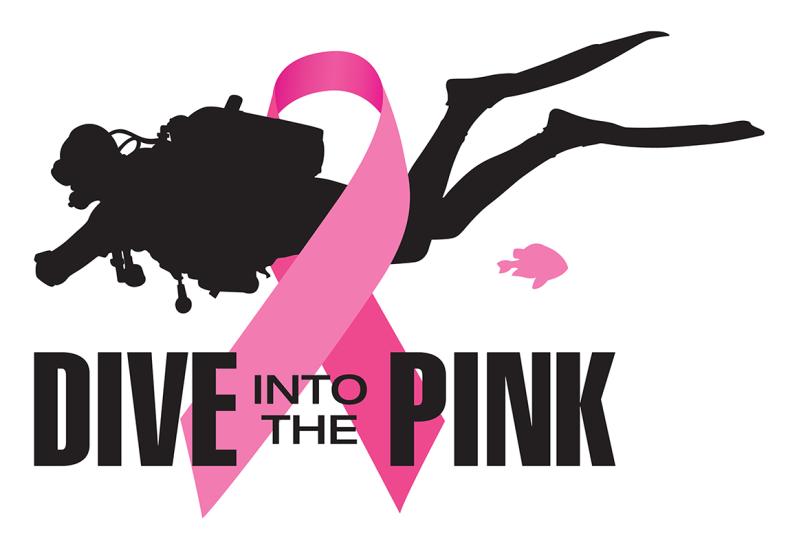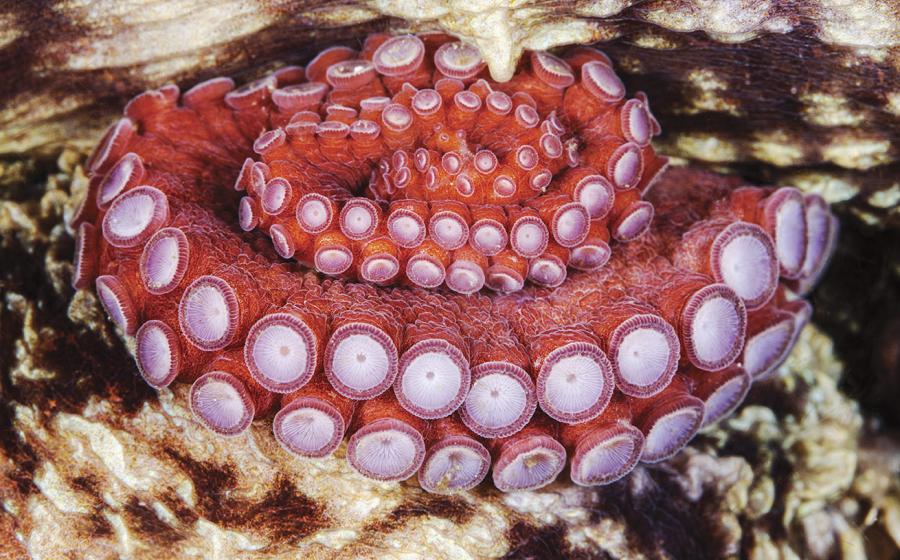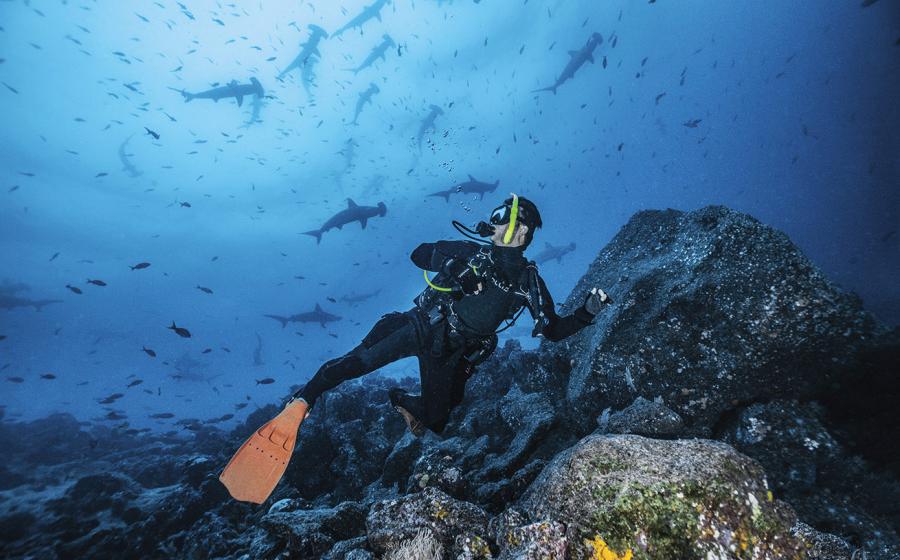Dive Training Tips: The Diver's Mouth

Smiling Divers Training
Here's a stat to chew on: Approximately half of the U.S. population doesn't see a dentist at least once a year as recommended by the American Dental Association. Though diving and dentistry seem about as closely related as butterflyfish and bicycles, your oral health can be a surprisingly important factor as you sink your teeth (quite literally) into diving.
"Your teeth and mouth are very involved in scuba diving," says diving dentist Eric Curtis, D.D.S., of Safford, Ariz., and spokesperson for the Academy of General Dentistry (AGD). "If either is in poor health or is not treated properly, you can find yourself with jaw joint pain, gum tissue problems, or 'tooth squeeze' — pain in the center of the tooth caused by changing pressures," he says. This cluster of problems, known as "diver's mouth syndrome," is fairly common, though not often reported because the symptoms, like headache and face pain, masquerade as other conditions. Here's what you need to know.
One Size Fits None
As your gateway to air, your mouthpiece is an essential piece of gear. "Yet when it comes to fit, it's one size fits nobody," says Curtis. Basic mouthpiece design has not changed since it was introduced in the 1940s, and it continues to cause the same problems for generations of divers. "Standard rubber mouthpieces are usually too small for most divers," says Curtis. Also the mouthpiece grip, which requires you to bite on the blocks with your foremost teeth, causes jaw joint stress and inflammation in about two-thirds of divers, according to surveys. Add the stress of dragging a bulky regulator through the water by your teeth, and you have a recipe for a bout of temporomandibular joint syndrome (TMJ) — a condition marked by headache, pain in the face or jaw, difficulty chewing and ringing in the ears.
"If you're already prone to TMJ, this is especially problematic," says Curtis. But even if you're not, the excitement of scuba diving can make normally slack-jawed people clench like a terrier playing tug. Aside from making a conscious effort to loosen your grip, you can make your mouth more comfortable by customizing your mouthpiece as much as possible. In a small study of healthy men ages 25 to 35, researchers tested the comfort of three different types of mouthpiece — standard, semi-custom silicone and a fully customized molded model — during dives of 45 minutes in duration. The standard mouthpiece required twice as much effort to hold in place as the fully customized model and caused lip numbness as well as twice as much jaw and head pain. "Poorly fitting mouthpieces can also cut your gums," says Curtis.
"For frequent divers, customization is the way to go," says Curtis. "Or if you already own your own regulator and are having problems, contour it to better fit your mouth." If you're just renting for the day, experiment with a few mouthpieces before the actual dive to find the one that is most comfortable.
If despite your best efforts you emerge from a dive with TMJ symptoms, moist heat is the treatment of choice, says Curtis. "Take some ibuprofen and apply a moist, comfortably hot washcloth or get in the jacuzzi." Like other joint pain, the symptoms should subside with a little rest and basic care. If they linger, talk to your dentist when you get home.
The Big Squeeze
Any place air bubbles can be trapped and expand is a potential point of pain for divers. Cracks, crevices and holes in teeth, though not terribly common, can pave the way for a nasty case of barodontalgia--otherwise known as "tooth squeeze" — or, in rare cases, exploding teeth.
"Anything that allows a little bit of air to be caught--a cavity, unfinished root canal, defective edge on a crown or filling, abscess or gum disease — can trap a bubble, which expands and causes intense pain upon ascent," says Curtis. Symptoms include toothache, bleeding, or a cracked or broken tooth. "Though I've never seen one personally, there have been cases of teeth exploding when a diver ascends," says Curtis. "More commonly, divers will just have pain, or in worse cases, a break or chip."
You can take the edge off with an over-the-counter pain reliever like Tylenol or Advil. But preventive care is better, says scuba enthusiast Thomas A. Howley, D.D.S., of Perkiomenville, Pa., president-elect of the AGD. "Make sure you're in good dental health before your dive trip," he says. Though you don't need to see a dentist who knows the sport, it's a good idea to mention that you'll be diving, so the dentist can pay special attention to fillings, crowns and other potential problem areas. "Obviously, if you are in the middle of a procedure like a root canal or crown, get it finished before you dive," adds Curtis. If possible, don't dive for at least 24 hours after treatment to minimize your risk of tooth squeeze.
Caution: Choking Hazard
The jury is out regarding the risks of diving with dentures or partial dentures. Some dentists say it's perfectly safe, so long as you are careful. Others caution that in the excitement of the dive, it's easy to inadvertently suck them in and either swallow or start choking on them — not particularly desirable when you're 30 feet down.
"If you're a regular diver and you're comfortable with your equipment, you're probably fine," says Howley. "But if you have a very small partial that could easily be swallowed, it's a good idea to remove it before diving." Otherwise, follow the same advice as people with natural teeth — see your dentist to double-check that everything is properly fitted before your trip.
Likewise, diving with braces is generally safe, though it's a good idea to let your orthodontist know you'll be diving, because some braces are equipped with springs and wires that may come detached and could present a choking hazard. Also, biting down on a regulator mouthpiece for 30 or 45 minutes can place a little additional stress on teeth that are still being aligned, so a diver wearing braces can expect that his mouth may be a little more tender or sore than usual.
Smile and Say, "Scuba!"
Following the basic dental care you learned as a kid can help keep your teeth in top diving shape. Floss once and brush twice daily, and see your dentist at least once a year, preferably close to diving trips, for a professional cleaning and checkup. Since many dives take place miles, if not days, away from quality dental care, it's also good medicine to be equipped for dental emergencies, especially if you have a mouthful of fillings, crowns and bridges just waiting to cut loose in a remote locale.
"You can buy portable, cheap, but very effective dental emergency kits at most pharmacies or grocery stores," says Academy of General Dentistry president-elect Thomas A. Howley, D.D.S. These kits let you repair loose caps or lost fillings with a strong dentist-quality cement that'll hold until you can see your dentist. "My rule of thumb is that if you pack emergency supplies, you'll never need them — so if you're prone to problems, bring it along," says Howley.
Divers Photo by Shutterstock
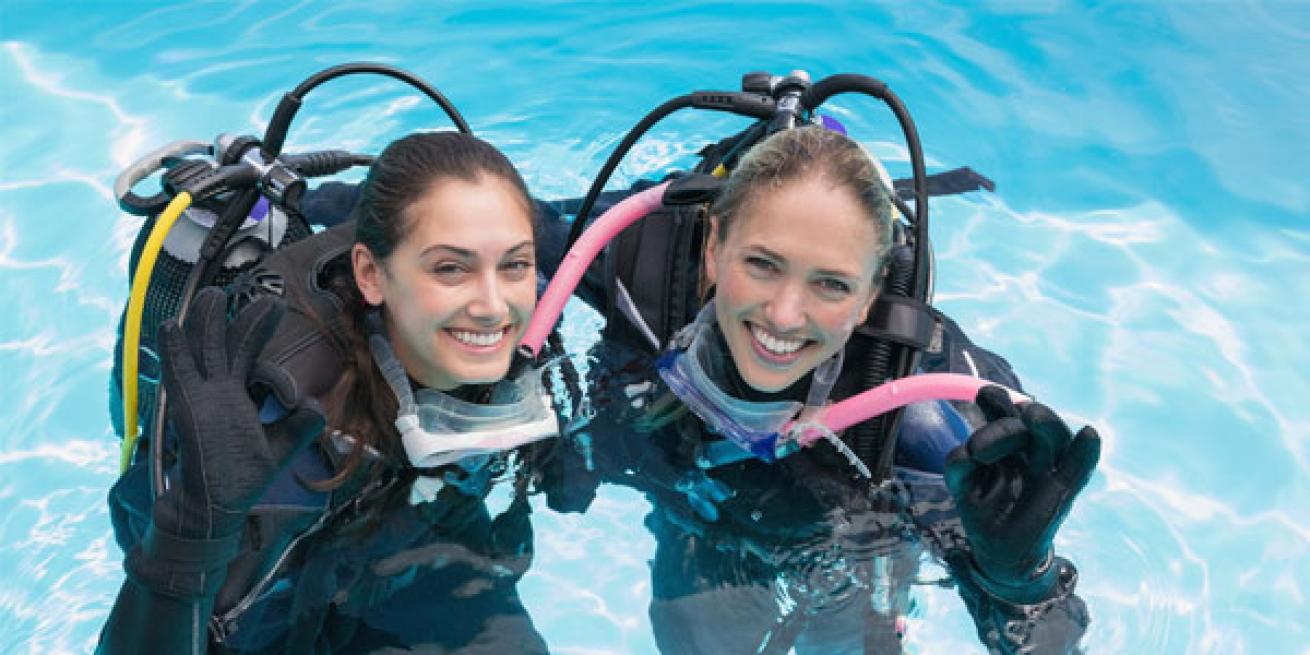
Here's a stat to chew on: Approximately half of the U.S. population doesn't see a dentist at least once a year as recommended by the American Dental Association. Though diving and dentistry seem about as closely related as butterflyfish and bicycles, your oral health can be a surprisingly important factor as you sink your teeth (quite literally) into diving.
"Your teeth and mouth are very involved in scuba diving," says diving dentist Eric Curtis, D.D.S., of Safford, Ariz., and spokesperson for the Academy of General Dentistry (AGD). "If either is in poor health or is not treated properly, you can find yourself with jaw joint pain, gum tissue problems, or 'tooth squeeze' — pain in the center of the tooth caused by changing pressures," he says. This cluster of problems, known as "diver's mouth syndrome," is fairly common, though not often reported because the symptoms, like headache and face pain, masquerade as other conditions. Here's what you need to know.
One Size Fits None
As your gateway to air, your mouthpiece is an essential piece of gear. "Yet when it comes to fit, it's one size fits nobody," says Curtis. Basic mouthpiece design has not changed since it was introduced in the 1940s, and it continues to cause the same problems for generations of divers. "Standard rubber mouthpieces are usually too small for most divers," says Curtis. Also the mouthpiece grip, which requires you to bite on the blocks with your foremost teeth, causes jaw joint stress and inflammation in about two-thirds of divers, according to surveys. Add the stress of dragging a bulky regulator through the water by your teeth, and you have a recipe for a bout of temporomandibular joint syndrome (TMJ) — a condition marked by headache, pain in the face or jaw, difficulty chewing and ringing in the ears.
"If you're already prone to TMJ, this is especially problematic," says Curtis. But even if you're not, the excitement of scuba diving can make normally slack-jawed people clench like a terrier playing tug. Aside from making a conscious effort to loosen your grip, you can make your mouth more comfortable by customizing your mouthpiece as much as possible. In a small study of healthy men ages 25 to 35, researchers tested the comfort of three different types of mouthpiece — standard, semi-custom silicone and a fully customized molded model — during dives of 45 minutes in duration. The standard mouthpiece required twice as much effort to hold in place as the fully customized model and caused lip numbness as well as twice as much jaw and head pain. "Poorly fitting mouthpieces can also cut your gums," says Curtis.
"For frequent divers, customization is the way to go," says Curtis. "Or if you already own your own regulator and are having problems, contour it to better fit your mouth." If you're just renting for the day, experiment with a few mouthpieces before the actual dive to find the one that is most comfortable.
If despite your best efforts you emerge from a dive with TMJ symptoms, moist heat is the treatment of choice, says Curtis. "Take some ibuprofen and apply a moist, comfortably hot washcloth or get in the jacuzzi." Like other joint pain, the symptoms should subside with a little rest and basic care. If they linger, talk to your dentist when you get home.
The Big Squeeze
Any place air bubbles can be trapped and expand is a potential point of pain for divers. Cracks, crevices and holes in teeth, though not terribly common, can pave the way for a nasty case of barodontalgia--otherwise known as "tooth squeeze" — or, in rare cases, exploding teeth.
"Anything that allows a little bit of air to be caught--a cavity, unfinished root canal, defective edge on a crown or filling, abscess or gum disease — can trap a bubble, which expands and causes intense pain upon ascent," says Curtis. Symptoms include toothache, bleeding, or a cracked or broken tooth. "Though I've never seen one personally, there have been cases of teeth exploding when a diver ascends," says Curtis. "More commonly, divers will just have pain, or in worse cases, a break or chip."
You can take the edge off with an over-the-counter pain reliever like Tylenol or Advil. But preventive care is better, says scuba enthusiast Thomas A. Howley, D.D.S., of Perkiomenville, Pa., president-elect of the AGD. "Make sure you're in good dental health before your dive trip," he says. Though you don't need to see a dentist who knows the sport, it's a good idea to mention that you'll be diving, so the dentist can pay special attention to fillings, crowns and other potential problem areas. "Obviously, if you are in the middle of a procedure like a root canal or crown, get it finished before you dive," adds Curtis. If possible, don't dive for at least 24 hours after treatment to minimize your risk of tooth squeeze.
Caution: Choking Hazard
The jury is out regarding the risks of diving with dentures or partial dentures. Some dentists say it's perfectly safe, so long as you are careful. Others caution that in the excitement of the dive, it's easy to inadvertently suck them in and either swallow or start choking on them — not particularly desirable when you're 30 feet down.
"If you're a regular diver and you're comfortable with your equipment, you're probably fine," says Howley. "But if you have a very small partial that could easily be swallowed, it's a good idea to remove it before diving." Otherwise, follow the same advice as people with natural teeth — see your dentist to double-check that everything is properly fitted before your trip.
Likewise, diving with braces is generally safe, though it's a good idea to let your orthodontist know you'll be diving, because some braces are equipped with springs and wires that may come detached and could present a choking hazard. Also, biting down on a regulator mouthpiece for 30 or 45 minutes can place a little additional stress on teeth that are still being aligned, so a diver wearing braces can expect that his mouth may be a little more tender or sore than usual.
Smile and Say, "Scuba!"
Following the basic dental care you learned as a kid can help keep your teeth in top diving shape. Floss once and brush twice daily, and see your dentist at least once a year, preferably close to diving trips, for a professional cleaning and checkup. Since many dives take place miles, if not days, away from quality dental care, it's also good medicine to be equipped for dental emergencies, especially if you have a mouthful of fillings, crowns and bridges just waiting to cut loose in a remote locale.
"You can buy portable, cheap, but very effective dental emergency kits at most pharmacies or grocery stores," says Academy of General Dentistry president-elect Thomas A. Howley, D.D.S. These kits let you repair loose caps or lost fillings with a strong dentist-quality cement that'll hold until you can see your dentist. "My rule of thumb is that if you pack emergency supplies, you'll never need them — so if you're prone to problems, bring it along," says Howley.
Divers Photo by Shutterstock

